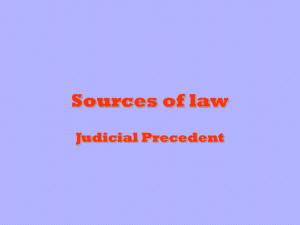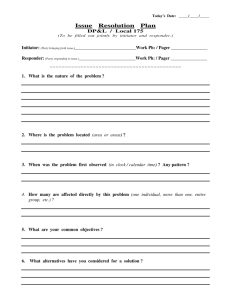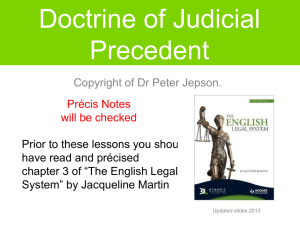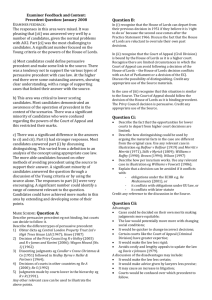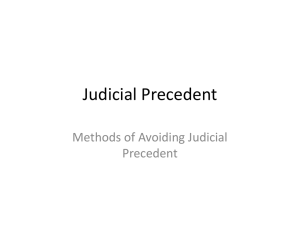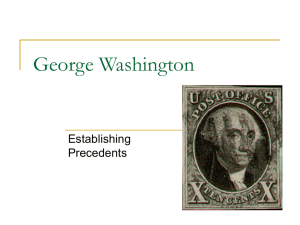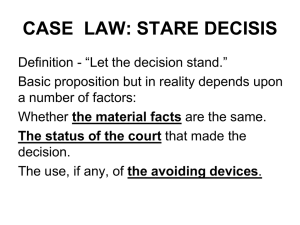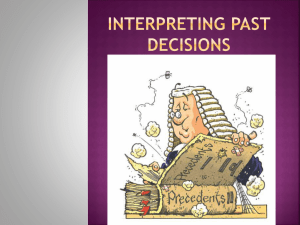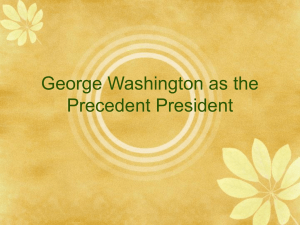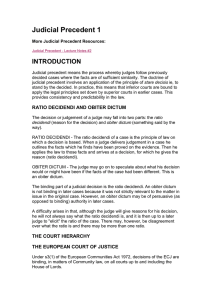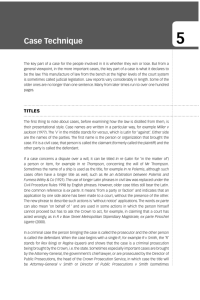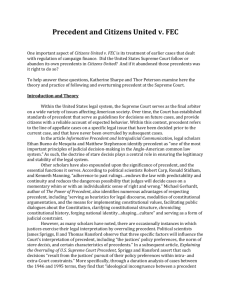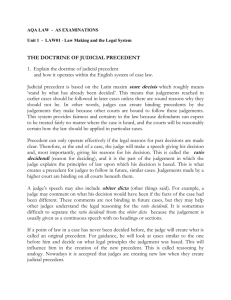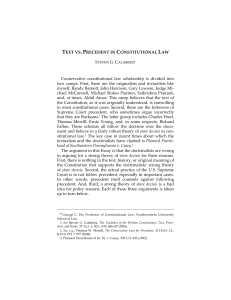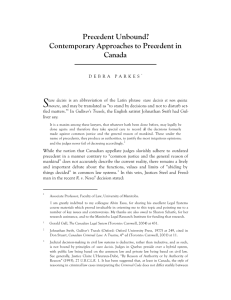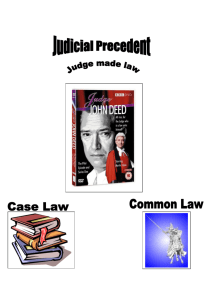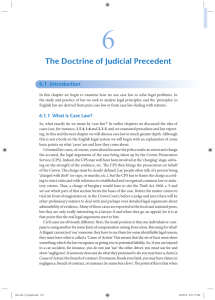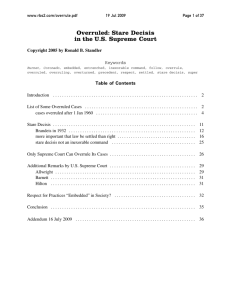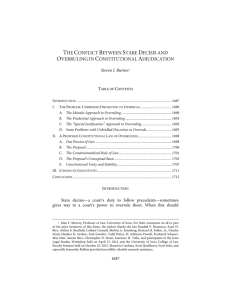Click here
advertisement
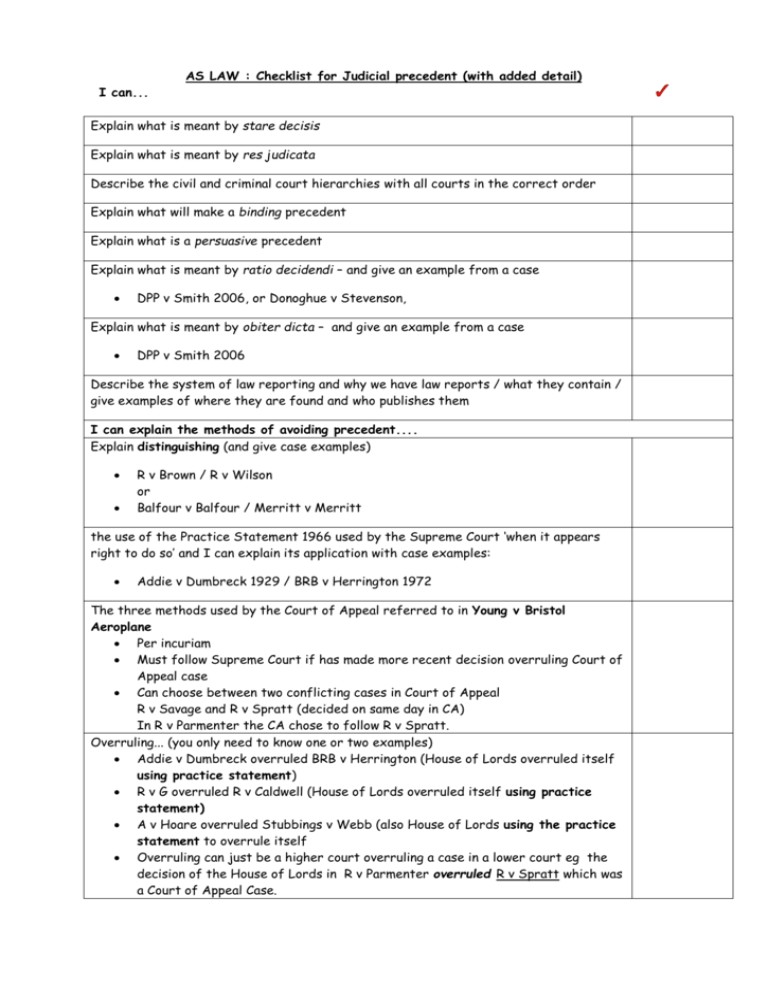
AS LAW : Checklist for Judicial precedent (with added detail) I can... Explain what is meant by stare decisis Explain what is meant by res judicata Describe the civil and criminal court hierarchies with all courts in the correct order Explain what will make a binding precedent Explain what is a persuasive precedent Explain what is meant by ratio decidendi – and give an example from a case DPP v Smith 2006, or Donoghue v Stevenson, Explain what is meant by obiter dicta – and give an example from a case DPP v Smith 2006 Describe the system of law reporting and why we have law reports / what they contain / give examples of where they are found and who publishes them I can explain the methods of avoiding precedent.... Explain distinguishing (and give case examples) R v Brown / R v Wilson or Balfour v Balfour / Merritt v Merritt the use of the Practice Statement 1966 used by the Supreme Court ‘when it appears right to do so’ and I can explain its application with case examples: Addie v Dumbreck 1929 / BRB v Herrington 1972 The three methods used by the Court of Appeal referred to in Young v Bristol Aeroplane Per incuriam Must follow Supreme Court if has made more recent decision overruling Court of Appeal case Can choose between two conflicting cases in Court of Appeal R v Savage and R v Spratt (decided on same day in CA) In R v Parmenter the CA chose to follow R v Spratt. Overruling... (you only need to know one or two examples) Addie v Dumbreck overruled BRB v Herrington (House of Lords overruled itself using practice statement) R v G overruled R v Caldwell (House of Lords overruled itself using practice statement) A v Hoare overruled Stubbings v Webb (also House of Lords using the practice statement to overrule itself Overruling can just be a higher court overruling a case in a lower court eg the decision of the House of Lords in R v Parmenter overruled R v Spratt which was a Court of Appeal Case. I can also explain reversing which is not a method of avoiding precedent - When a decision in one court is overturned in a higher court in the same case : again in R v Parmenter the House of Lords reversed the decision of the Court of Appeal in R v Parmenter. I can give four advantages of judicial precedent with an explanation / case example / illustration Certainty / predictability : eg the rules of duty of care in tort are set out in Donoghue v Stevenson 1932 and have been recognised ever since in spite of later cases the general principle survives from the case Flexibility: methods of avoiding precedent allow change: R v R 1991 provoked Parliament to make a new Act of Parliament AFTER the case changed the law to make marital rape criminal Detailed Rules: thousands of case reports, judges write lengthy judgements eg DPP v Smith (gives guidance on what can and can’t amount to ABH) New and original cases can be dealt with when social situations change: Gillick v West Norfolk Area Health Authority – permitted doctors to give girls under 16 contraceptives without parental consent I can give four or more disadvantages of Judicial Precedent with an explanation / case example / illustration Volume: thousands of pages of reports exist and one estimate suggests there are half a million pages of reports with hundreds of new reports each year. This is very difficult for ordinary people and even lawyers to cope with when trying to research an area of law. Complexity: eg Rickards v Lothian appeared to have two ratio decidendi and R v Brown had a number of different ratio from each judge on why consent to sadomasochistic would be illegal if it caused ABH or GBH Rigidity: the courts have to wait for a case to appear to change an outdated law eg R v R 1991 – seems very late in time for ‘rape’ to finally be recognised as possible between a man and wife. Lord Denning criticised Retrospective effect: R v R again – the man who committed the ‘crime’ could not have known it would be made criminal by the judgement of the court in his case as it changed the law Undemocratic: we live in a democracy but Judges are not elected and should not be making laws and this is unconstitutional as the principle of the ‘separation of powers’ means the judges and the lawmakers should not be the same people I have done practise questions and had feedback on my answers. I have acted on feedback given.
